
Breaking News
 Alex Jones: Epstein Files, Bondi Hearing + El Paso Shutdown | PBD #737
Alex Jones: Epstein Files, Bondi Hearing + El Paso Shutdown | PBD #737
 A Day's Wage in Silver: Ancient Times to Today
A Day's Wage in Silver: Ancient Times to Today
 The 'Empire Killer' Strikes Again
The 'Empire Killer' Strikes Again
 Doug Casey on Iran: How a "Limited Strike" Could Snowball Into a System Shock
Doug Casey on Iran: How a "Limited Strike" Could Snowball Into a System Shock
Top Tech News
 Drone-launching underwater drone hitches a ride on ship and sub hulls
Drone-launching underwater drone hitches a ride on ship and sub hulls
 Humanoid Robots Get "Brains" As Dual-Use Fears Mount
Humanoid Robots Get "Brains" As Dual-Use Fears Mount
 SpaceX Authorized to Increase High Speed Internet Download Speeds 5X Through 2026
SpaceX Authorized to Increase High Speed Internet Download Speeds 5X Through 2026
 Space AI is the Key to the Technological Singularity
Space AI is the Key to the Technological Singularity
 Velocitor X-1 eVTOL could be beating the traffic in just a year
Velocitor X-1 eVTOL could be beating the traffic in just a year
 Starlink smasher? China claims world's best high-powered microwave weapon
Starlink smasher? China claims world's best high-powered microwave weapon
 Wood scraps turn 'useless' desert sand into concrete
Wood scraps turn 'useless' desert sand into concrete
 Let's Do a Detailed Review of Zorin -- Is This Good for Ex-Windows Users?
Let's Do a Detailed Review of Zorin -- Is This Good for Ex-Windows Users?
 The World's First Sodium-Ion Battery EV Is A Winter Range Monster
The World's First Sodium-Ion Battery EV Is A Winter Range Monster
 China's CATL 5C Battery Breakthrough will Make Most Combustion Engine Vehicles OBSOLETE
China's CATL 5C Battery Breakthrough will Make Most Combustion Engine Vehicles OBSOLETE
Disaster Survival Hygiene: What to Do When the Water Stops

This video: By Lona Miller, Sandy City Community 4 Leader- What happens when the water stops flowing and the toilets won't flush? In a disaster, maintaining proper sanitation is crucial to preventing disease and keeping your environment safe. Preparing ahead of time can make all the difference—know how to set up an emergency toilet, seal drain plugs to prevent sewage backup, and safely bury waste if necessary. Without proper planning, unsanitary conditions can spread illness quickly, turning a crisis into a catastrophe. Are you ready to keep your home clean and your family healthy when disaster strikes? Why it matters: Poor sanitation during disasters can lead to disease outbreaks. Emergency toilet setup: Plan for a backup toilet, such as a bucket with a seat and biodegradable bags. Drain plug protection: Seal drains to prevent sewage backup from contaminated water systems. Waste disposal: To bury human waste, dig a hole at least 2.5 feet deep x 2.5 feet deep, layer the waste with mulch and dirt for decomposition. Health impact: Proper sanitation reduces the risk of infections and disease and keeps your family safe in a crisis.



